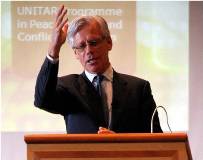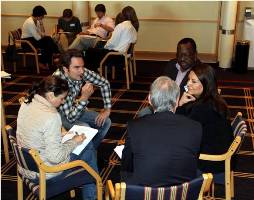 The 2011 UNITAR-IPI Fellowship Programme in Peacemaking and Preventive Diplomacy was held in Holmenkollen, Norway and addressed by a range of distinguished resource persons from around the world, including for the first time, the OSCE High Commissioner on National Minorities, Knut Vollebaek. Ambassador Vollebaek discussed the conflict prevention work carried out by his office in OSCE Participating States, including his mandate, the methodology he uses and case examples of successful conflict prevention situations.
The 2011 UNITAR-IPI Fellowship Programme in Peacemaking and Preventive Diplomacy was held in Holmenkollen, Norway and addressed by a range of distinguished resource persons from around the world, including for the first time, the OSCE High Commissioner on National Minorities, Knut Vollebaek. Ambassador Vollebaek discussed the conflict prevention work carried out by his office in OSCE Participating States, including his mandate, the methodology he uses and case examples of successful conflict prevention situations.
The two-week Fellowship Programme is the only programme of its kind in the UN system. It involves hands-on practice in the analysis of violent conflicts and their resolution. During the Fellowship Programme, participants studied and applied negotiation and mediation theories and techniques; benefited from lessons and best practices drawn from case studies of conflict situations; and engaged in practical conflict analysis, negotiation and mediation exercises. A simulation, based on a current conflict was developed to give participants the opportunity to practice mediation and negotiation using a real-world conflict situation.
 UNITAR’s interest-based, problem-solving approach to negotiation and mediation is based on the latest knowledge in the field of conflict resolution and encourages the exploration of all parties’ interests, so that innovative options can be developed to address parties’ concerns and aspirations. In contrast to more commonly used power-based and rights-based approaches, interest-based negotiation and mediation tend to be less costly, enabling a more lasting, integrative, win-win solution to be found.
UNITAR’s interest-based, problem-solving approach to negotiation and mediation is based on the latest knowledge in the field of conflict resolution and encourages the exploration of all parties’ interests, so that innovative options can be developed to address parties’ concerns and aspirations. In contrast to more commonly used power-based and rights-based approaches, interest-based negotiation and mediation tend to be less costly, enabling a more lasting, integrative, win-win solution to be found.
Forty senior and middle-level participants were selected for the programme from over 130 applications and nominations. These included participants from the United Nations Department of Political Affairs, the Department of Peacekeeping Operations, the Office for the Coordination of Humanitarian Assistance, the Office of Legal Affairs, the Office of the High Commissioner for Human Rights, the Office of the High Commissioner for Refugees and the United Nations Human Settlements Programme. As well, participants were selected from the African Union, the Organization for Security and Cooperation in Europe, the Organization of the Islamic Conference and the Organization of American States, as well as diplomats from countries on all continents.
Since its inception in 1993, the Fellowship Programme has trained over 650 individuals directly involved in conflict resolution on behalf of the UN, regional organizations and member states.
The 2011 Programme was funded by the Ministries of Foreign Affairs of Norway, Sweden, and Finland and the Government of Australia.

